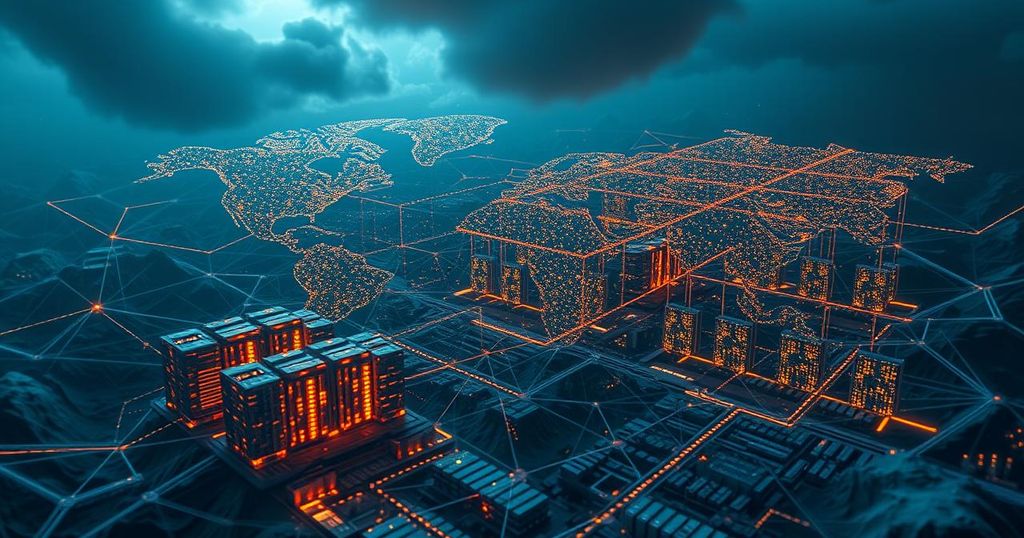The Role of AI Data Centers in Shaping Nuclear Energy Adoption and Climate Strategy
The article addresses the relationship between escalating power consumption from artificial intelligence data centers and the potential role of nuclear energy in mitigating climate change. It examines the challenges faced by traditional nuclear power while highlighting the utility of small modular reactors (SMRs) in meeting increased energy demands. Major tech companies are taking the lead in developing nuclear projects, suggesting a significant shift in the energy landscape to support AI’s growth sustainably.
The surge in artificial intelligence (AI) utilization has precipitated a significant increase in power consumption, particularly by large-scale data centers, which rely heavily on electricity sourced from fossil fuels. Despite Google’s commitment to achieving carbon neutrality, recent reports revealed a 50% rise in their emissions over the preceding five years. According to projections by McKinsey, data centers are anticipated to account for 11-12% of the United States’ total power consumption by the year 2030, which would represent more than a threefold increase from current levels. In contrast to fossil fuel-generated energy, nuclear power is recognized for its zero greenhouse gas emissions, presenting a viable solution to mitigate climate change by substituting conventional energy sources. Nuclear energy has been posited as a reliable companion to renewable sources such as solar and wind, functioning continuously irrespective of weather conditions. However, historical nuclear incidents, including those at Three Mile Island, Chernobyl, and Fukushima, have engendered apprehension among environmentalists. Germany’s recent decision to decommission its last nuclear facilities in 2023, in favor of developing new natural gas plants, underscores such concerns. Traditional nuclear power plants are characterized by high costs and local opposition, frequently necessitating extensive timelines for construction—often over a decade. In contrast, small modular reactors (SMRs) offer a more agile and safer alternative, being smaller, prefabricated units that can be deployed in a more timely manner. Despite these advantages, American utility companies have been sluggish to adopt SMR technology. Recognizing this bottleneck, billionaire Bill Gates founded TerraPower to champion SMR development, and recently commenced construction for its inaugural facility in Wyoming. To address the electric demand of burgeoning data centers, major technology corporations are taking proactive measures. In a notable move, Microsoft struck an agreement to revive the Three Mile Island plant to power its data centers. Furthermore, Google has initiated a collaboration with Kairos Power to construct seven SMRs, with operational commencement projected for 2030. Similarly, Amazon Web Services has allocated $500 million toward three nuclear projects, including a partnership with Dominion Energy to develop SMRs in Virginia and a separate initiative for four SMRs in Washington State through a partnership with Energy Northwest. The implementation of these projects not only stands to benefit Amazon but may also provide power access to a wider range of customers. The implications of Google and Amazon’s nuclear endeavors extend beyond the individual projects; if these SMRs are demonstrated to be both cost-effective and safe, more traditional public utilities may consider them a viable path to enhance capacity and phase out aging fossil fuel power plants. Intriguingly, the substantial energy demands of AI data centers might ultimately contribute to a reduction in greenhouse gas emissions.
The article discusses the intersection of artificial intelligence and energy consumption, with a specific focus on nuclear power as a potential means of mitigating climate change. It outlines the challenges posed by traditional nuclear energy production, including public perception and operational costs, while introducing small modular reactors as a promising alternative. The proactive initiatives by major technology companies like Google and Amazon illustrate a shifting landscape in energy production in response to the increasing demands of AI processing.
In sum, the rapid escalation in energy needs driven by AI data centers poses significant challenges regarding carbon emissions and energy sourcing. Nuclear power, particularly in the form of small modular reactors, presents a promising avenue for addressing these challenges. The strategic initiatives by corporations such as Microsoft, Google, and Amazon signify a critical shift towards sustainable energy solutions that may not only satisfy their operational requirements but also contribute positively to the global effort of reducing greenhouse gas emissions.
Original Source: www.forbes.com




Post Comment